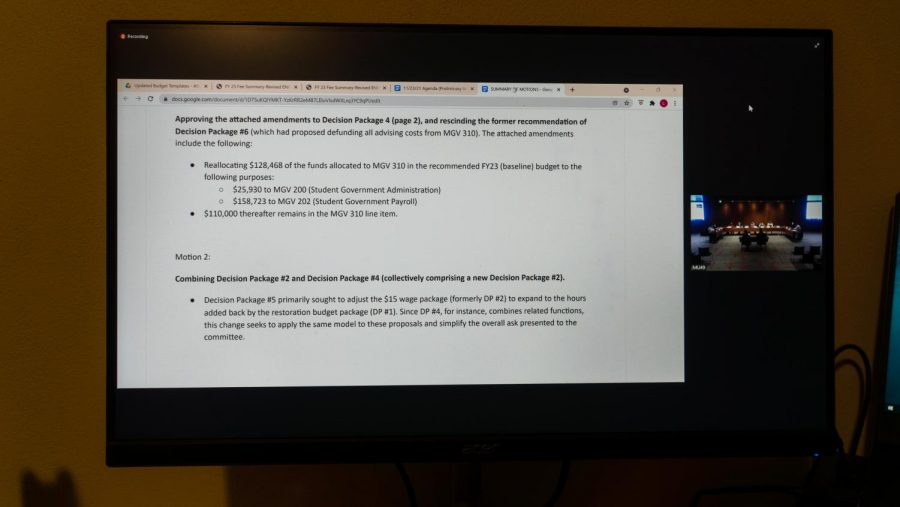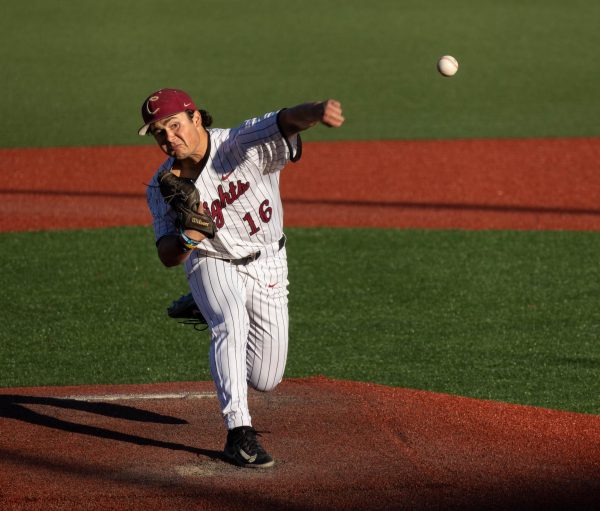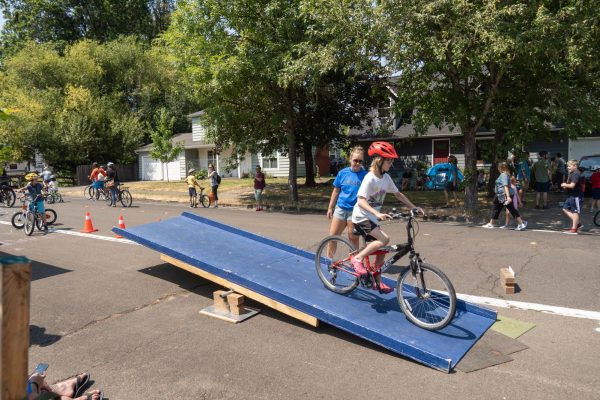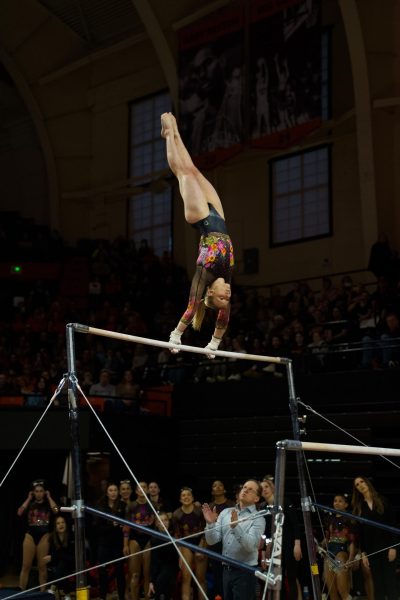Student fee funded units request budget increases after year of low operation levels due to COVID-19
The Oregon State University Student Fee Committee deliberates on the budgets for student fees at a hybrid in person and virtual meeting on Nov. 23. The biggest topic of conversation during the deliberations was a raise that would affect many student workers who have jobs that are paid by student fees.
November 25, 2021
Student fee funded units at Oregon State University have proposed increases to their budgets to return to pre-pandemic operation levels, which would increase student fees during the 2022-23 academic year.
Over the past few weeks, the Student Fee Committee has heard budget asks, or requests, from the eight student fee funded units—Student Experience & Engagement (including Diversity & Cultural engagement), Memorial Union, Associated Students of OSU, Recreational Sports, Intercollegiate Athletics, Family Resource Center, Human Services Resource Center and performing arts—with most units requesting funds to maintain operations plus inflation.
Orange Media Network, which includes The Daily Barometer, is part of SEE and would be affected by any budget increases that are given to the unit.
“For units to add new services or add things to their budget that aren’t already a part of their budget, they have to introduce what is known as decision packages,” explained Joe Page, the ASOSU speaker pro tempore—on a temporary basis—of the house.
In the past fiscal year, many units took cuts—or, in ASOSU’s case, a zero percent increase which, accounting for inflation, actually means a decrease in funding for the unit’s operations and functions.
“There was a lot of focus on reducing the asks in the last budgeting cycle and not asking for things that aren’t absolutely critical,” SFC Chair Mak Khan said. “This year there is a slight increase to accommodate for that change and make sure they are able to go back to pre-pandemic levels of services.”
This year, in addition to asking to return to the 2021 fiscal year operating budgets, ASOSU has proposed multiple decision packages.
The decision package that gained the most attention is the ASOSU executives’ election promise to increase student minimum wage to $15 an hour.
While the MU and athletics have not indicated much willingness to support the package, according to Page, the other six units have adopted the decision package in their ask to support the initiative.
Many students are looking to this ask as a big priority not only for themselves as workers but also to help fill in employment gaps around campus, evidenced by a passionate, unprompted student testimony expressing hope for filling more jobs on campus during the ASOSU unit presentation meeting on Nov. 17.
Aside from the minimum wage, another package from ASOSU lies within the SafeRide branch. They’re hoping to expand the program to include a walking version where students can get a late night walking escort anywhere on campus similar to the existing SafeRide program with vehicles.
The last notable proposal that ASOSU presented was an ask to defund their student government faculty advisors. This would essentially redistribute the funds already allocated without replacing them for the next and following fiscal years.
“The reason for that is because there are two advisors funded by the index,” Page said. “They work for the division of student affairs, they don’t really work for ASOSU, so we don’t have any oversight or say in their evaluations or how they interact with us, so we are looking to restructure our advising model.”
Currently, this advisor funding accounts for just over $200,000 in ASOSU’s budget. If the package were passed at the final vote taking place Dec. 3, those funds could then go to support other services within the unit.
The remaining seven units have also proposed packages, in addition to asks, for funds to return to pre-pandemic levels and maintain existing services.
The FRC wants to add another support system position within their Our Little Village program to better provide resources for students and faculty in need of child care.
While performing arts proposed a package to pay graduate teaching assistants, the HSRC also hopes to begin setting aside money for new equipment and an additional employee position to assist with navigating student needs.
Between all eight units’ asks, the proposed total increase of student incidental fees for the 2022-23 academic year stands at a 9.225% increase, meaning roughly a $41.97 increase for students in the fall, winter and spring terms.
With the proposal, the summer incidental fee, which differs from other regular academic terms, would increase by 2.32%, coming in at a $5.46 increase from this past summer.
According to Uwe Keist, the ASOSU public relations chair, these SFC committee deliberations are not final. The final deliberation session and vote by the SFC are scheduled for Nov. 30 from 6 p.m. to 9 p.m. and Dec. 3 from 3 p.m. to 6 p.m. in the MU.
It is in these final meetings that the committee will look holistically at the expected increase with the lens of what best serves students in the upcoming academic year. The approved budget will move to the ASOSU congress for further discussions beginning in early January.
“They are really looking at whether or not the budget requests from each unit is something that is in the interest of students and they make decisions on that,” Keist said.

























































































































